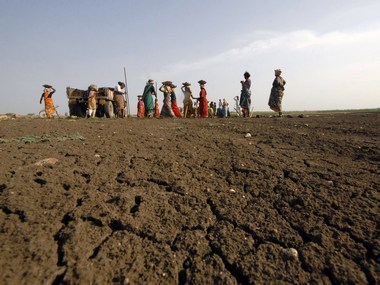
A law enacted by the previous UPA Government in India to provide rural employment guarantee proved to be a significant help in reducing the aggravated distress of the rural poor in pandemic times last year. However while the pandemic related distress had not yet abated, the union government with undue haste reduced the budget for this important program, leading to serious problems.
During the financial year 2020-21, as mass distress was reported, the government increased the budget for the rural employment program, often called NREGA because of the law which enabled it (the National Rural Employment Guarantee Act). This higher allocation should have been maintained this year, as the difficult situation still persisted. But the govermnment made a 34% cut, compared to the enhanced revised udget for the previous year, amounting to a cut in absolute terms of Rs. 385,000 million, or INR 385 billion.
This budget cut has proved to be very distressing for the poor. This and related issues have been emphasized in two statements released recently on October 29 and November 3 by the People’s Action for Employment Guarantee ( PAEG), an organization of academics and actvists advocating for proper implementation of NREGA. This reduction was made despite the pending liability from previous years amounting to Rs. 171,800 million, or 23% of the total budget.
As demand from the poor for NREGA continued to be high, the budget for one year up to March 31 2022 has already been exhausted to the extent of around 90%. This means that very little is left for the remaining period and in fact there is already negtive net balance in some states. Hence PAEG has highlighted the need to increase the allocation for NREGA work on the basis of urgency. Only 6 per cent of households have completed 80 days of employment so far, while they are entitled to up to 100 days work in a year.
The review by PAEG has also pointed out that 13 per cent of workers were refused employent. Nerly 80 million payments for NREGA work were pending as on November 3 2021, affecting about 50 million workers. Before the festival of Diwali, the union government gave dearness allowance and special bonus payent for its employees, but did not clear the pending dues of the much more needy NREGA workers, several of them on the brink of starvation. As on November 3 2021, payments of about INR 3000 million had been rejected on technical reasons to about 2.4 million workers, on average about Rs. 1250 per worker, which means a lot to those fighting hunger on daily basis, and there is no assurance of when, if at all, technical problem will be sorted out. Will the authorities, in the interests of justice, announce a fixed date for making all corrections and then clear the dues with the interest component added?
LibTech, an organistion cosisting of social scientists, data scientists and activists has also issued an important statement arund the same time stating that only 29 per cent of NREGA work payments have been made within the stipulated time. At the same time the burden of workload has been unnecessarily increased in recent times by insisting on providing caste based divisions of payments. There is no justification for caste-based break-up of wage payments. At a time when the need was to speed up pending payments the authorities have responded by introducing a new burden for officials which also adds to tensions in society. The system of Aadhar based payments has also brought more problems. While reforms are needed, but the authorities, by introducing peculiar changes, are adding to problems, not solving them.
These organizations have done very well to draw attention to some important aspects of the implementation of NREGA and one hopes that remedial action based on this will be taken soon.
Bharat Dogra is a journalist who has been close to several social movements. His recent books include Man Over Machine and Protecting Earth for Children.
Related posts:
Related posts:
Views: 0
 RSS Feed
RSS Feed

















 November 6th, 2021
November 6th, 2021  Awake Goy
Awake Goy  Posted in
Posted in  Tags:
Tags: 
















